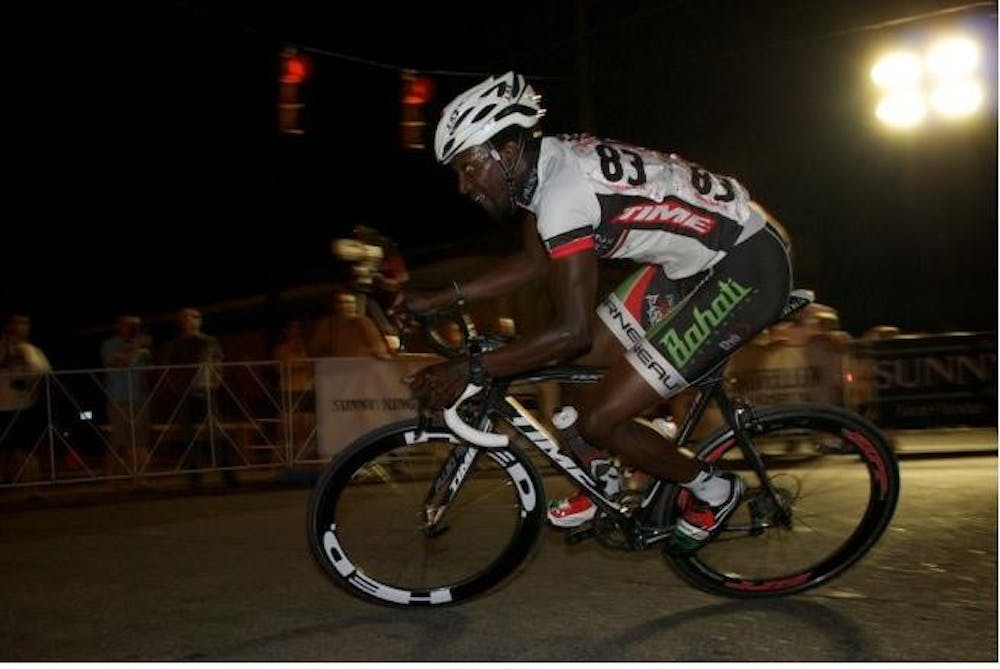
(photo courtesy of VeloNews.com) Despite how cool Bahati looks on his bike, the difference between how I view him and how a non-cycling fan views him simply boils down to perspective.
Perspective is everything. I realized this after meeting one of my favorite athletes last weekend at a national cycling race in Anniston, Ala. You’ve probably not heard of him, but Rahsaan Bahati is one of the best Criterium cycling champions in the United States today. His organization, Bahati Foundation, raises money and awareness to help put inner-city kids on bicycles so that they might escape the dangers of low-income neighborhoods. Bahati himself came out of the Los Angeles suburb of Compton and rose to fame quickly on two wheels.
So while Bahati means a lot to an avid cyclist and cycling fan like me, most people would probably not have a clue who this guy was if he passed them on the sidewalk and even mentioned his name. His significance to me and other cyclists is all a matter of perspective.
One man’s average Joe is another man’s hero. This made more sense to me as our cycling team recently visited Ingram Pye Elementary school less than a mile from Mercer’s campus. To these kids, ranging from kindergarten to fifth grade, we were impressive — college athletes with nice bicycles and a knack for racing. And while we certainly don’t think we’re big stuff, they hold us in high esteem. It’s all a matter of perspective.
I wonder how some of the world’s most recognizable athlete’s feel about their own significance. For some, the separation between one’s own significance and the significance acknowledged by the general public can be troublesome.
Take for example LeBron James’ mother, Gloria James, in a recent news story last week in which she allegedly assaulted a valet parking attendant outside of a hotel when it took them too long for them to bring her vehicle. She was quoted shouting the words, “Do you know who I am?” to the parking attendant.
Perhaps the parking attendant didn’t know that Gloria James was LeBron’s mother. Even if he did, would it have made a difference? Should it have made a difference?
No wonder athletes have a hard time hanging it up. I don’t believe Brett Favre has a complex where he has to be in the public eye all the time, but his retirement-unretirement situation got ridiculous after the third go-around. Lance Armstrong’s comeback out of retirement launched the cycling superstar into the public eye once again, albeit with a guarded approach.
For those halfway around the world who follow cricket like we follow baseball, India’s Sachin Tendulkar is a superstar. He helped the country win the world title this past week in rousing fashion over Pakistan. Even if we don’t understand the game, shouldn’t we recognize his name? Again, for the billion fans that tuned into the championship cricket match, he was the hero. It’s a matter of perspective.
My sports card collection is collecting dust on the very top shelf of my bedroom closet and while I don’t claim to have any rare cards or valuable vintage ball cards, some hold special significance to me. My Keith Lockhart autographed baseball card is probably my favorite, even though Lockhart was a utility infielder for most of his career for the Atlanta Braves in the early 2000s. I simply liked Lockhart’s walk-out song when he would come to bat and sent him a letter in my 13-year-old writing with a baseball card asking for his autograph.
That trip to the mailbox to find the letter from Mr. Lockhart is one that I’ll always remember. At the time, an autograph from a major leaguer was a story that I could tell at school all week long. Now it all seems so silly, blue Sharpie ink on a cardboard baseball card with a glossy finish.
I don’t like to think that I’m jaded against stardom and status, but when I get to meet a professional athlete of any sport, I rarely ask for an autograph anymore and sometimes will ask for a picture. A handshake and a conversation will suffice for me. Just to know that they’re human and perhaps extremely talented at their profession is enough for me. It’s a matter of perspective.





